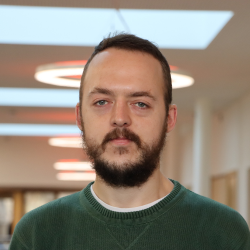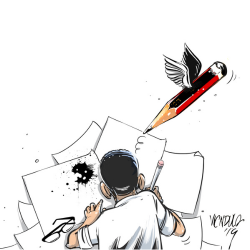‘Plandemic’: Contextualising Covid-19 Scepticism in St Lucia
Joseph Powell and Victor Ndula
![Four-frame cartoon portraying different images of a crowned Lion of Judah bearing a sceptre with a red, yellow and green ribbon. In the first frame, the lion is shackled and appears in the sea beneath a slave ship. In the second frame, the lion stands on an island watching an approaching ship, labelled colonialism. In the third frame, the lion is in a laboratory labelled ‘medical experimentation’, surveyed by three white doctors in lab coats. In the final frame, the lion holds up his paw to stop the approach of a boat loaded with covid vaccines, stating “Dis time rasta mus have a say”].](/sites/fass.open.ac.uk/files/images/research/projects/DDR/addressing-social-challenges/plandemic.jpg)
The Rastafari of St Lucia were invariably sceptical of Covid-19 narratives, lockdowns and vaccines. Many spoke of Covid-19 as a ‘plandemic’, an elite plot to damage the health and fertility of global (or Black and African) populations and limit their freedoms. Vaccination was often avoided, seen as physical corruption akin to the ‘mark of the beast’ of Revelation 17:9. Many figures in government and policy worldwide challenged these outlooks as ‘dis/misinformation’, but few attempted to understand them.
Joseph Powell’s research amongst Rastafari communities (represented here by the Lion of Judah) revealed three primary historical sources which, together with ideas of purity and 'naturality', ground this scepticism. First, the brutal use and disposal of Black bodies during the trans-Atlantic slave trade. Second, their subjugation under white, European colonialism. Third, the wanton use of Black bodies for so-called ‘scientific’ investigation, including the Tuskegee syphilis experiment as well as localised polio testing in St Lucia. The epic scale of these abuses (seen as part of a larger ‘Babylonian’ system of evil and oppression) renders a deeply scarred foundation upon which present worldviews are established. Simply dismissing sceptical narratives as ‘mis/disinformation’ is therefore inappropriate and ineffectual.
Ultimately, the St Lucian government tried to engage and understand the Rastafari community on the issues of Covid-19 vaccination through a series of ‘sensitization sessions’, representing a more empathetic model for political engagement with religious minorities. As the final frame of Victor Ndula’s cartoon makes clear, the freedom of choice of Rastafari to vaccinate (as some did) or not to vaccinate, that Rasta ‘mus have a say’, is crucially important. This freedom respects a spiritual and bodily autonomy denied to so many ancestors for so long.
About the academic

Dr Joseph Powell is a British Academy Postdoctoral Fellow in the Faculty of Divinity at the University of Cambridge. His research primarily explores Rastafari spirituality in the Caribbean and the UK.
About the artist

Victor Ndula is an editorial cartoonist, illustrator, and comic artist who lives and works in Nairobi, Kenya, where he lends his voice to social commentary through his cartoons. Victor is passionate about using cartoons, comics, and illustrations to provoke public discourse and engagement with pertinent societal issues.
Previous Image: The Tool against Disinformation
This illustration is part of the Academics and Artists addressing Social Challenges initiative
Next Image: Firefly